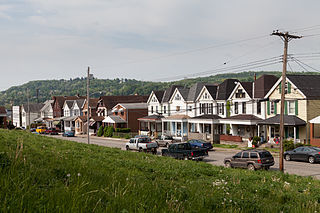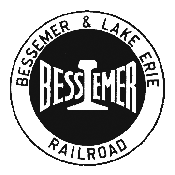Related Research Articles

Glassport is a borough in Allegheny County, Pennsylvania, United States, approximately 10 miles (16 km) south of Pittsburgh and the confluence of the Monongahela and Allegheny rivers where they form the Ohio River. Glassport lies along the east side of the Monongahela River in the "Mon Valley", where many blue-collar municipalities have suffered severe economic decline in the wake of the loss of steel-making throughout the Greater Pittsburgh area. In 1910, the population of Glassport was 5,540. By 1940, it had risen to 8,748, but has since declined to 4,475 as of the 2020 census.
Outokumpu Oyj is a group of international companies headquartered in Helsinki, Finland, employing 10,600 employees in more than 30 countries. Outokumpu is the largest producer of stainless steel in Europe and the second largest producer in the Americas. Outokumpu also has a long history as a mining company, and still mines chromium ore in Keminmaa for use as ferrochrome in stainless steel. The largest shareholder of Outokumpu is the Government of Finland, with 26.6% ownership, including the shares controlled by Solidium, The Social Insurance Institution of Finland, Finnish State Pension Fund and Municipality Pension Agency.
Ling-Temco-Vought (LTV) was a large American conglomerate which existed from 1961 to 2001. At its peak, it was involved in aerospace, airlines, electronics, steel manufacturing, sporting goods, meat packing, car rentals, and pharmaceuticals, among other businesses.

The Bessemer and Lake Erie Railroad was a class II railroad that operates in northwestern Pennsylvania and northeastern Ohio.

Copper-clad steel (CCS), also known as copper-covered steel or the trademarked name Copperweld is a bi-metallic product, mainly used in the wire industry that combines the high mechanical strength of steel with the conductivity and corrosion resistance of copper.

ATI Inc. is an American producer of specialty materials headquartered in Dallas, Texas. ATI produces metals including titanium and titanium alloys, nickel-based alloys and superalloys, stainless and specialty steels, zirconium, hafnium, and niobium, tungsten materials, forgings and castings.

Republic Steel is an American steel manufacturer that was once the country's third largest steel producer. It was founded as the Republic Iron and Steel Company in Youngstown, Ohio in 1899. After rising to prominence during the early 20th Century, Republic suffered heavy economic losses and was eventually bought out before re-emerging in the early 2000s as a subsidiary. The company currently manufactures Special Bar Quality (SBQ) steel bars and employs around 2,000 people. It is currently owned by Grupo Simec, based in Guadalajara, Mexico.

The Jones and Laughlin Steel Corporation, also known as J&L Steel or simply as J&L, was an American steel and iron manufacturer that operated from 1852 until 1968. The enterprise began as the American Iron Company, founded in 1852 by Bernard Lauth and Benjamin Franklin Jones, about 2.5 mi (4.0 km) south of Pittsburgh along the Monongahela River. Lauth's interest was bought in 1854 by James Laughlin. The first firm to bear the name of Jones and Laughlin was organized in 1861, and headquartered at Third & Ross in downtown Pittsburgh.

The Aliquippa and Ohio River Railroad is a six-mile short line railroad in Aliquippa, Pennsylvania, United States, controlled by Genesee & Wyoming Inc. through its ownership of the Ohio Central Railroad System. It lies between CSX Transportation's ex-Pittsburgh and Lake Erie Railroad line and the Ohio River, extending south from CSX's yard in northern Aliquippa to near the Ambridge-Aliquippa Bridge. Formerly known as the Aliquippa and Southern Railroad, its owner and primary customer was LTV Steel, which mostly closed its Aliquippa plant in 1985 and sold the line to the Ohio Central in 2002. The AOR now connects the Aliquippa Industrial Park, which occupies the LTV site, with CSX.
Vallourec S.A. is a multinational manufacturing company headquartered in Meudon, France. Vallourec specializes in hot rolled seamless steel tubes, expandable tubular technology, automotive parts, and stainless steel, which it provides to energy, construction, automotive, and mechanical industries. Vallourec shares are listed on NYSE Euronext.
Sumitomo Electric Industries, Ltd. is a manufacturer of electric wire and optical fiber cables. Its headquarters are in Chūō-ku, Osaka, Japan. The company's shares are listed in the first section of the Tokyo, Nagoya Stock Exchanges, and the Fukuoka Stock Exchange. In the period ending March 2021, the company reported consolidated sales of US$26,5 billion.
Vitus is a British direct-to-consumer bicycle brand owned by Wiggle Ltd and is known for its range of medium to high-end road and mountain bikes. The brand has gained popularity for its innovative design and use of lightweight materials. Vitus bicycles have been ridden by numerous professional athletes and have achieved success in various cycling disciplines.
Olympic Steel, Inc. is a metals service center based in Cleveland, Ohio. The company processes and distributes carbon, coated and stainless flat-rolled sheet, coil and plate steel, aluminium alloy, tin plate, and metal-intensive branded products primarily in the United States. Metals processing and value added services include tempering, stretch leveling, cutting-to-length, slitting, edging, shearing, blanking, burning, forming, shot blasting, laser punching, plate rolling, fabricating, machining, and welding. Its Chicago Tube & Iron subsidiary is a distributor of steel tubing, pipe, bar, valves & fittings, and fabricates pressure parts.
Delta Career Education Corporation was a Virginia-based for-profit institution of higher learning that declared bankruptcy in 2018. Twenty one of its campuses were sold to Ancora Education. It was a wholly owned subsidiary of Gryphon Investors, through Gryphon Colleges Corporation (GCC).
The Queen's Award for Enterprise: International Trade (Export) (2002) was awarded on 21 April 2002, by Queen Elizabeth II.
Copperweld Corp. v. Independence Tube Corp., 467 U.S. 752 (1984), is a major US antitrust law case decided by the Supreme Court concerning the Pittsburgh firm Copperweld Corporation and the Chicago firm Independence Tube. It held that a parent company is incapable of conspiring with its wholly owned subsidiary for purposes of Section 1 of the Sherman Act because they cannot be considered separate economic entities.

A. O. Smith Corporation is an American manufacturer of both residential and commercial water heaters and boilers, and the largest manufacturer and marketer of water heaters in North America. It also supplies water treatment and water purification products in the Asian market. The company has 27 locations worldwide, including five manufacturing facilities in North America, as well as plants in Bengaluru in India, Nanjing in China and Veldhoven in The Netherlands.
WL Ross & Co is a private equity company founded and based in New York by Wilbur Ross in April 2000. The company focuses on investments in financially distressed companies with undervalued stocks, in the $100 to $200 million range, usually in the United States, Asia, Korea, Ireland, Japan, France and China. By acquiring majority stake in their investments through purchases and/or buyouts, WL Ross & Co. LLC then have the option of restructuring, turnarounds, mergers, reorganizations and industry consolidation. Starting in 2002, WL Ross began acquiring the assets of bankrupt steel companies such as LTV Steel Corp, Bethlehem Steel, Weirton Steel, Acme Steel, Georgetown Steel, Youngstown Sheet and Tube, and Republican Steel. By 2003 Ross had established relationships with the United Steelworkers, promising to save jobs. WL Ross founded the company International Steel Group (ISG) by combining bankrupt LTV Corp., Acme Steel and Bethlehem Steel, which quickly became the largest integrated steel company in the United States and was a Fortune 500 company by 2005.
Tréfimétaux is a French metallurgy conglomerate formed in 1962 by the merger of the Tréfileries et Laminoirs du Havre with the Compagnie française des métaux. In 1967, Tréfimétaux was acquired by Pechiney and in 1987 was sold to the Italian company SMI. Various plants were closed or sold over the years, leaving two factories in France at Givet and Niederbruck . These factories are now operated by Tréfimétaux SAS, a subsidiary of Cupori (60%) and SMI (40%).
Sterling Plumbing is the brand-name of a line of plumbing products manufactured by Kohler Co. The company designs and manufactures a diverse selection of product for the kitchen and bath, including faucets, toilets, sinks, whirlpool tubs, shower doors and bathroom accessories.
References
- ↑ "Copperweld".
- ↑ The New Yorker (1977-02-07). "The Marts of Trade: Retaking Pittsburgh".
- ↑ Snyder, Thomas P. (February 25, 1978), "County hopes to save jobs at Copperweld", Pittsburgh Press, Pittsburgh, PA
- ↑ Bankrupt.com (2011-07-07). "LTV Bankruptcy News".
- ↑ Arcelor Mittal (2005-10-04). "Arcelor Mittal Press Release". Archived from the original on 2011-09-27.
- ↑ Wire World (May 2006). "David S. Jones buys Company". Archived from the original on 2011-10-06.
- ↑ "Fushi Copperweld Completes 'Going Private' Transaction". Reuters. 2012-12-26. Retrieved 2 April 2013.[ permanent dead link ]
- ↑ "Kinderhook Acquires Copperweld". October 3, 2019.